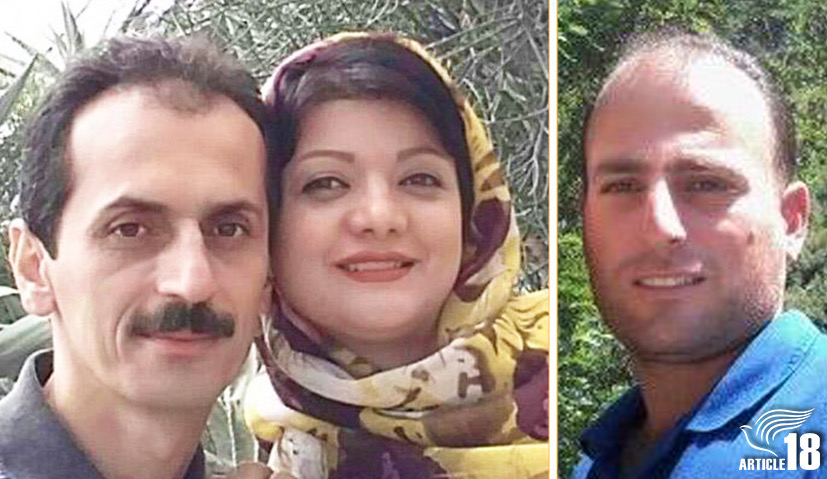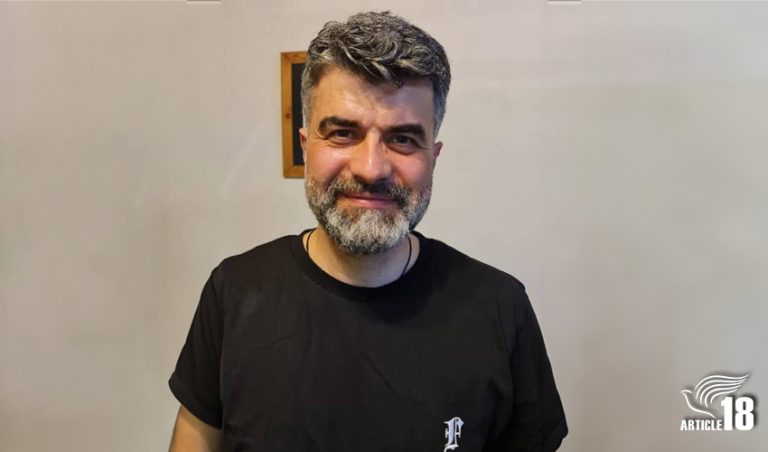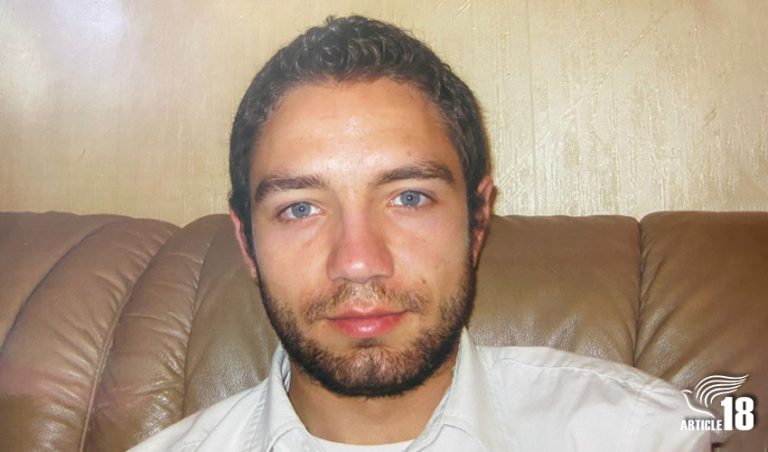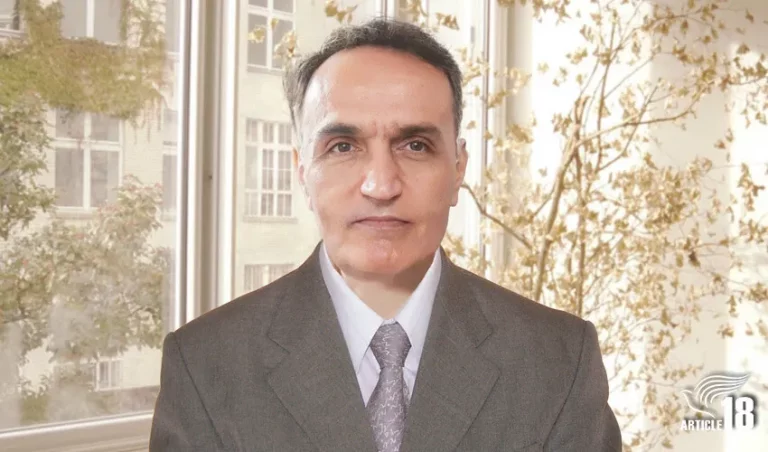
Case referenced by
Article18, Jubilee Campaign, HRANA, United For Iran, Middle East Concern, International Institute for Religious Freedom, The Christian Post, Iran Press Watch, Open Doors, CSW, Voice of the Martyrs, International Christian Concern
Summary
Hadi (Moslem) Rahimi, his aunt Sakine (Mehri) Behjati, and married couple Ramin Hassanpour and Kathrin (Saeede) Sajadpour – all converts – were given prison sentences in August 2020 of between two and five years for “acting against national security” by belonging to a house-church and “spreading Zionist Christianity”. Moslem began serving his sentence in January 2022, and the three others were summoned to begin their sentences a month later. The Supreme Court rejected the appeals of Hadi and Mehri for a retrial.
Case in full
Moslem, Mehri, Ramin and Saeede, all members of the non-Trinitarian “Church of Iran”, were first arrested in February 2020 for their membership of a house-church in Rasht, northern Iran.
On 14 May 2020, they were taken to Lakan Prison after being unable to afford the bail set for them – of 500 million tomans (around $30,000) – when they were officially charged at Branch 10 of the Revolutionary Court in Rasht.
Ramin and Saeede’s two sons – who were aged 16 and seven at the time – were forced to fend for themselves during their detention, the older staying at home by himself and the younger going to stay with his grandfather.
They were eventually released a week later on reduced bail of 200 million tomans ($11,500).
On 1 August 2020, the converts were sentenced to between two and five years in prison for “acting against national security” by belonging to a house-church and “spreading Zionist Christianity”.
Ramin was given a five-year sentence, Moslem four years, and Mehri and Saeede two years.
Their appeals were rejected in September 2020.
On 9 January 2022, Moslem left behind his nine-month-old daughter to begin serving his four-year sentence at Tehran’s Evin Prison so that the property deed submitted by a friend to secure his bail may be released.
A month later, the three others were told they must hand themselves in to the authorities in Tehran by the end of February.
On 16 February 2022, Moslem and Mehri were told their applications for a retrial had been rejected by Branch 9 of the Supreme Court.
On 16 April 2022, Mehri handed herself in to the authorities in Tehran to begin her sentence, and was later permitted a transfer to Lakan Prison in Rasht, so she could be closer to her children.
However, in July 2022 she was denied access to a scheme that would have allowed her to spend most of her time outside prison – either working or looking after her children.
On 15 February 2023, Moslem was released as part of a wider amnesty of prisoners on the occasion of the 44th anniversary of the Islamic Republic.
That same month, Mehri was also pardoned and released from the remainder of her two-year sentence.
Recommendations
Article18 requests that the international community and Christians worldwide:
- Call for the immediate acquittal of Moslem, Mehri, Ramin and Saeede.
- Call for the swift application of due process in the cases of all who are detained and/or awaiting charges, trials, sentences or appeal hearings on account of their Christian faith and activities in Iran.
- Western countries should prioritise human rights in negotiations with Iran, especially freedom of religion or belief, and urge the government of Iran to recognise all minority-faith adherents, including converts to Christianity, as full citizens before the law, enjoying their full human rights.
- The international community should hold the Iranian government accountable for failing to uphold its international and constitutional commitments to protect the freedom of Christians in its territories. Closing churches, appropriating church property, arresting church leaders and threatening churchgoers are violations of freedom of religion or belief, as prescribed in Article 18 of the ICCPR, to which Iran is a signatory, without reservation, and therefore legally bound to uphold. Meanwhile, Article 13 of Iran’s Constitution states that Zoroastrians, Jews and Christians are recognised religious minorities, who are free to perform their religious rites and ceremonies. And Article 23 says “investigation of individuals’ beliefs is forbidden, and no-one may be molested or taken to task simply for holding a certain belief.”
Background
There has been a significant increase in human-rights violations in Iran in recent years, and particularly in the persecution of religious minorities, principally of Christians from the Iranian house-church movement.
Ethnic Christian communities (Assyrian and Armenian) are permitted a degree of freedom to worship, although it is illegal for these churches to conduct services in Persian (the national language of Iran and the common language of converts).
Bibles and other Christian literature are also illegal in Persian and those found in possession of such materials, especially in sufficient quantities for distribution, can expect severe treatment and prison sentences. Therefore, the growing community of Christian converts are not permitted to attend recognised churches and they have to gather for worship in secret house-churches, risking arrest and imprisonment.
In the past few years, a number of Christians have been handed down sentences of between 10 and 15 years, charged with offences such as “acting against national security”. These political charges are used to help avoid an international outcry at more clearly religiously-motivated charges such as “apostasy”.
Those detained or charged often have to obtain and hand over exorbitant amounts for bail, which are often forfeited as some choose to flee the country in the knowledge that they are very unlikely to receive a fair trial and just verdict. Those awaiting trial who flee the country are tried in absentia. Many will face a gruelling legal process, and until their case is heard, which could take several years, their lives are in limbo.
The majority of the Christians arrested in the last few years have been released, either after finishing their prison sentences or temporarily released on bail with severe warnings and threats against any further Christian activity. Once released, they are closely monitored, and risk re-arrest and imprisonment if they engage, or are suspected of engaging, in any Christian activity.
Iran was 9th on Open Doors’ 2022 World Watch List of the 50 countries where it is hardest to be a Christian.
Article18’s 2022 annual report noted that Iranian Christians “continue to suffer widespread violations of their rights”.
Of the publicly reported cases alone, 30 Christians endured imprisonment or exile in 2021 on charges related to their faith or religious activities, and 21 were still serving these sentences at the end of the year – 18 in prison, one in exile, and two more serving the remainder of their sentences at home with an electronic tag.
Many others faced ongoing legal battles, while Christians continued to flee the country to seek asylum elsewhere, despite worsening conditions for refugees in neighbouring countries such as Turkey.
Meanwhile, the first Christians were charged, sentenced and imprisoned under the controversial new amendments to Article 500 of the penal code, for “engaging in propaganda that educates in a deviant way contrary to the holy religion of Islam”.
There was also great inconsistency regarding which prisoners were permitted release with an electronic tag – a growing trend in 2021 – and which were rejected the opportunity; or which prisoners were offered parole, and which were cruelly denied it.



0 Comments
Trackbacks/Pingbacks